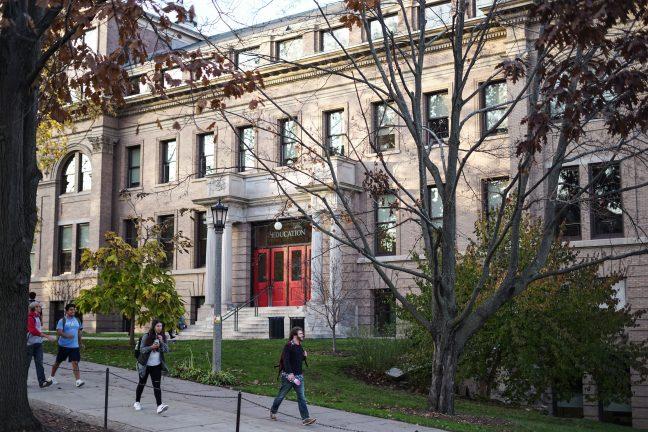In order to fill special education teacher vacancies, Milwaukee Public Schools recently partnered with the University of Wisconsin to create a new, federally funded program that funnels education graduates into the district. According to Wisconsin Public Radio, the program offers a 10-month teaching residency in the school district, where candidates will complete a special education teacher preparation master’s degree and receive a $46,500 stipend. Candidates must commit to teaching in MPS for three years following their completion of the program.
This program is an attempt to meet the district’s need for special education teachers in the midst of a statewide teacher shortage. A report from the Wisconsin Policy Forum found teacher turnover has been steadily increasing since the COVID-19 pandemic and urban and rural districts are at greater risk.
The partnership will likely prove beneficial for MPS as it offers enough seats to fill the district’s special education teacher shortage. The program also ensures the new special education teachers will have adequate qualifications to support students. This is especially important for MPS, as the district has a comparatively high proportion of socioeconomically disadvantaged students and students with special needs, according to Wisconsin Policy Forum.
The new program is an addition to the UW School of Education’s Teacher Pledge program, which similarly empowers future educators by offering tuition support and debt forgiveness in exchange for participants’ commitment to work at a Wisconsin school for three to four years post-graduation.
Both programs create financial incentives for education students to work in Wisconsin, which may invite racially diverse and low-income individuals into the teaching sector. A significant racial gap in college affordability hinders Black individuals’ access to higher education, according to a study from the Brookings Institution.
There seems to be a link between this finding and another Wisconsin Policy Forum study that found Black and Latinx high school graduates are about 20% less likely to pursue postsecondary education than their white counterparts. The study also showed there was a 15.2% decrease in enrollments among students of color in Wisconsin teacher education programs between 2012 and 2018.
It is important to consider the implications of decline in teacher diversity for student outcomes — especially for diverse districts like MPS. In fact, 90% of MPS students identify as people of color, but nearly two thirds of the staff is white. Teacher diversity is important in promoting teachers’ ability to understand and connect with students’ ethnic, cultural and lingual backgrounds. For instance, teachers who are familiar with the experiences of their diverse student populations can tailor their teaching styles to best accommodate their culture and values. Statistically, improvements are seen in test scores, attendance and suspension rates when students are taught by a same-race teacher, according to the Brookings Institution.
By providing financial support to education students through the Teacher Pledge program and the new MPS residency program, the UW School of Education might be able to break down institutional barriers for diverse students to pursue a teaching career.
But improving enrollment in teacher education programs is only half the battle. Wisconsin also faces great challenges in teacher retention. The Wisconsin Policy Forum report found the rate at which teachers leave their education careers entirely is significantly greater than the rate at which they merely move between different Wisconsin districts due to increased pressure on teachers, declining public respect for the profession, insufficient pay and more. If we are to maintain education graduates in district residency programs for the long-term, it is important to address the systemic challenges within the career first.
For urban school districts like MPS, there is also a concern about preventing younger teachers from moving into suburban school districts. Amidst a crisis of teacher turnover, white teachers are more likely to stay at schools with predominantly white student populations, according to the NYU Steinhardt School of Culture, Education, and Human Development. Additionally, new teachers are likely to feel unsupported by their coworkers, school administration and student misbehavior in urban schools, specifically.
This leads to an endless loop of young teachers entering and exiting urban school districts. Indeed, the Wisconsin Policy Forum report found the MPS student population is historically diverse and disadvantaged, requiring teachers to grapple with the adverse effects of poverty and trauma their students often face. Additionally, the district does not always have the resources to support its teachers.
One possible solution is to include training specific to urban school districts in the curriculums for teacher education and residency programs. Familiarizing future educators with the cultures and experiences of urban students through experiential training will decrease their likelihood of becoming overwhelmed and leaving school districts when they enter urban districts as new instructors.
The new residency program within MPS has great potential to increase teachers’ familiarity with the school district and its diverse student population through its required 10-month residency. New teachers who undergo training that includes mentoring, communication and planning with other educators and administrative support are 50% less likely to leave urban districts, according to NYU Steinhardt.
Partnerships between Wisconsin school districts and the UW School of Education are full of potential, not only resolving teacher shortages, but also increasing diversity in the education workforce. By reflecting on how educators can be maintained in urban school districts like MPS through district-specific training, these programs might even offer a long-term solution to teacher retention.
Aanika Parikh ([email protected]) is a sophomore studying molecular and cell biology.





















